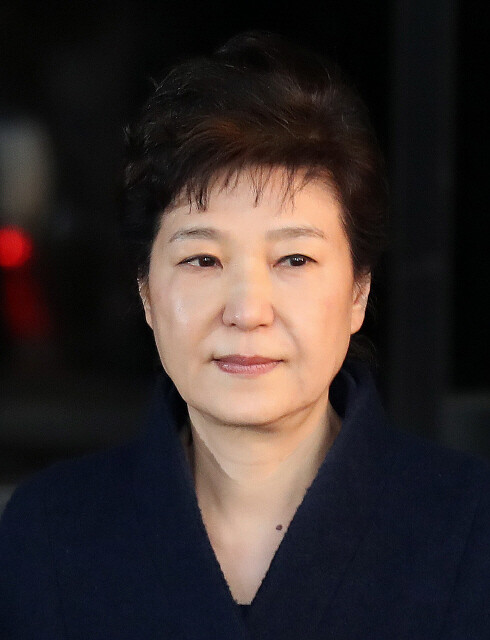hankyoreh
Links to other country sites 다른 나라 사이트 링크
First hearing in Park Geun-hye’s trial coming in May, ruling in October

The first hearing in the trial of former president Park Geun-hye is likely to take place after the May 9 presidential election, and the district court is expected to make its ruling around the end of October. While the trial could be shortened because of the ongoing trials of Park’s accomplices, including Choi Sun-sil, it could also be prolonged if hearings heat up over the 18 charges against Park. This leads to the possibility of another warrant being issued for her detention.
Just as with the other people linked to the influence-peddling scandal involving Park and Choi, preparatory hearings will be held before Park takes her seat in the dock. There were two preparatory hearings for Choi, former Blue House Senior Secretary for Policy Coordination Ahn Jong-beom and former Blue House Secretary Jung Ho-seong, who were indicted by the Prosecutors’ Special Investigations Headquarters in Nov. 2016, and there were three preparatory hearings for Samsung Electronics Vice Chairman Lee Jae-yong, who was indicted by the investigative team led by Special Prosecutor Park Young-soo in February. During the preparatory hearings, Prosecutors and Park Geun-hye’s attorneys will decide upon the points being debated, the evidence and the witnesses in the trial.
Prosecutors are likely to be represented directly by Lee Won-seok, chief of the first department of special investigations at Seoul Central District Prosecutors Office, and by Han Woong-jae, chief of the eighth division of criminal law, who were in charge of questioning Park. Another question is whether new attorneys will be joining Park‘s legal team during the preparatory hearings. Seven of Park’s attorneys have resigned, only leaving Yu Yeong-ha and Chae Myeong-seong on the team, and Park is reportedly looking for new attorneys to represent her. Since it’s common for the defendant not to attend the preparatory hearings, Park isn’t expected to appear in court until the first hearing is held.
The hearings in Park’s trial are expected to begin in the middle of May. It also took a month after Choi and Lee were charged before their hearings began. According to the Criminal Procedure Act, the initial trial of a defendant who has been detained cannot last for more than six months after the date of indictment. If the trial exceeds six months, the defendant must be released before the trial can proceed. Given this requirement, Park’s first trial will probably have to conclude before Oct. 16.
But if the court issues another warrant for Park’s detention in consideration of the reasons for which she was detained, the period of her detention could be extended, which would allow the trial to last for more than six months while she is behind bars. That was how the Seoul District Court extended the period of detention for former presidents Chun Doo-hwan (in office 1979-88) and Roh Tae-woo (1988-93) during their initial trial, which did not lead to a ruling until Aug. 1996, eight months after they were charged.
If Park is given a suspended sentence or found not guilty by the district court and then released, there are no limitations on the length of the appeal; in the same way, if she is given a suspended sentence or found not guilty on appeal, the Supreme Court has leeway in the timing of its decision. But if Park is found guilty by the district court and remains in detention, the appeals court must make its decision within six months. If her conviction is upheld on appeal, the Supreme Court must also make a decision within six months.
On Apr. 17, 1997, the Supreme Court upheld sentences of life in prison and 17 years in prison, respectively, for Chun and Roh, one year and four months after they were charged. The two former presidents were both released by a special pardon at the end of that same year.
By Kim Min-kyung, staff reporter
Please direct questions or comments to [english@hani.co.kr]

Editorial・opinion
![[Editorial] Does Yoon think the Korean public is wrong? [Editorial] Does Yoon think the Korean public is wrong?](https://flexible.img.hani.co.kr/flexible/normal/500/300/imgdb/original/2024/0417/8517133419684774.jpg) [Editorial] Does Yoon think the Korean public is wrong?
[Editorial] Does Yoon think the Korean public is wrong?![[Editorial] As it bolsters its alliance with US, Japan must be accountable for past [Editorial] As it bolsters its alliance with US, Japan must be accountable for past](https://flexible.img.hani.co.kr/flexible/normal/500/300/imgdb/original/2024/0417/6817133413968321.jpg) [Editorial] As it bolsters its alliance with US, Japan must be accountable for past
[Editorial] As it bolsters its alliance with US, Japan must be accountable for past- [Guest essay] Amending the Constitution is Yoon’s key to leaving office in public’s good graces
- [Editorial] 10 years on, lessons of Sewol tragedy must never be forgotten
- [Column] A death blow to Korea’s prosecutor politics
- [Correspondent’s column] The US and the end of Japanese pacifism
- [Guest essay] How Korea turned its trainee doctors into monsters
- [Guest essay] As someone who helped forge Seoul-Moscow ties, their status today troubles me
- [Editorial] Koreans sent a loud and clear message to Yoon
- [Column] In Korea’s midterm elections, it’s time for accountability
Most viewed articles
- 1Samsung barricades office as unionized workers strike for better conditions
- 2[Column] The clock is ticking for Korea’s first lady
- 3[Editorial] When the choice is kids or career, Korea will never overcome birth rate woes
- 4Why Israel isn’t hitting Iran with immediate retaliation
- 5[News analysis] After elections, prosecutorial reform will likely make legislative agenda
- 6S. Korea, Japan reaffirm commitment to strengthening trilateral ties with US
- 7Japan officially says compensation of Korean forced laborers isn’t its responsibility
- 8[Editorial] As it bolsters its alliance with US, Japan must be accountable for past
- 9[Editorial] Does Yoon think the Korean public is wrong?
- 10[Guest essay] How Korea turned its trainee doctors into monsters